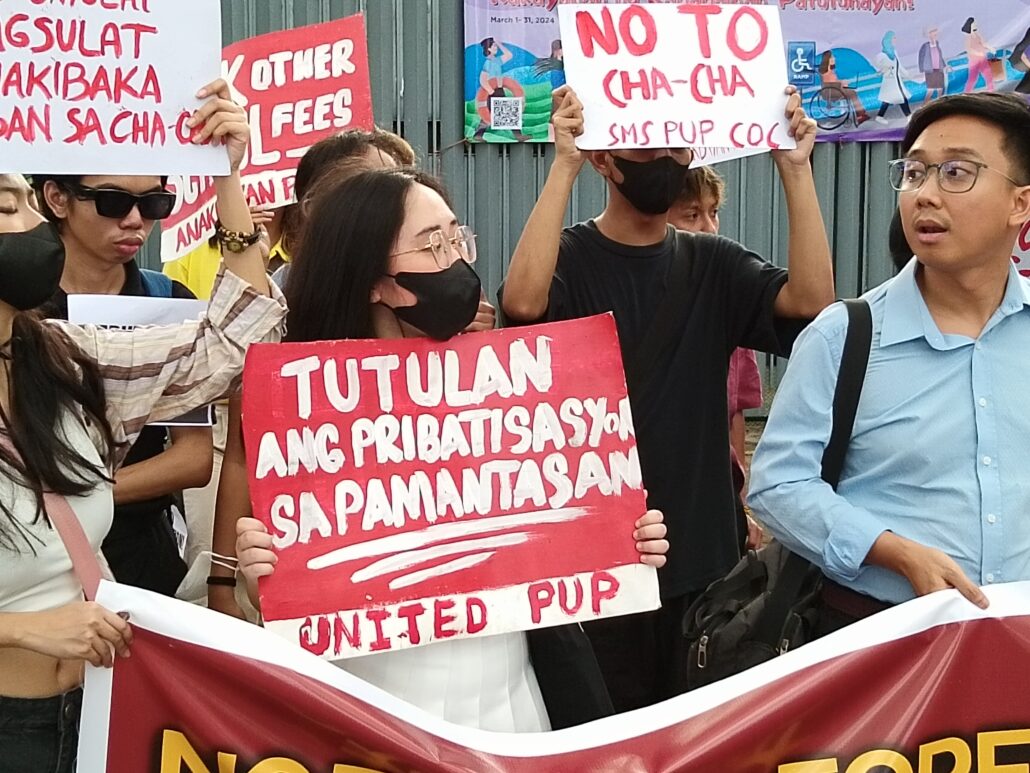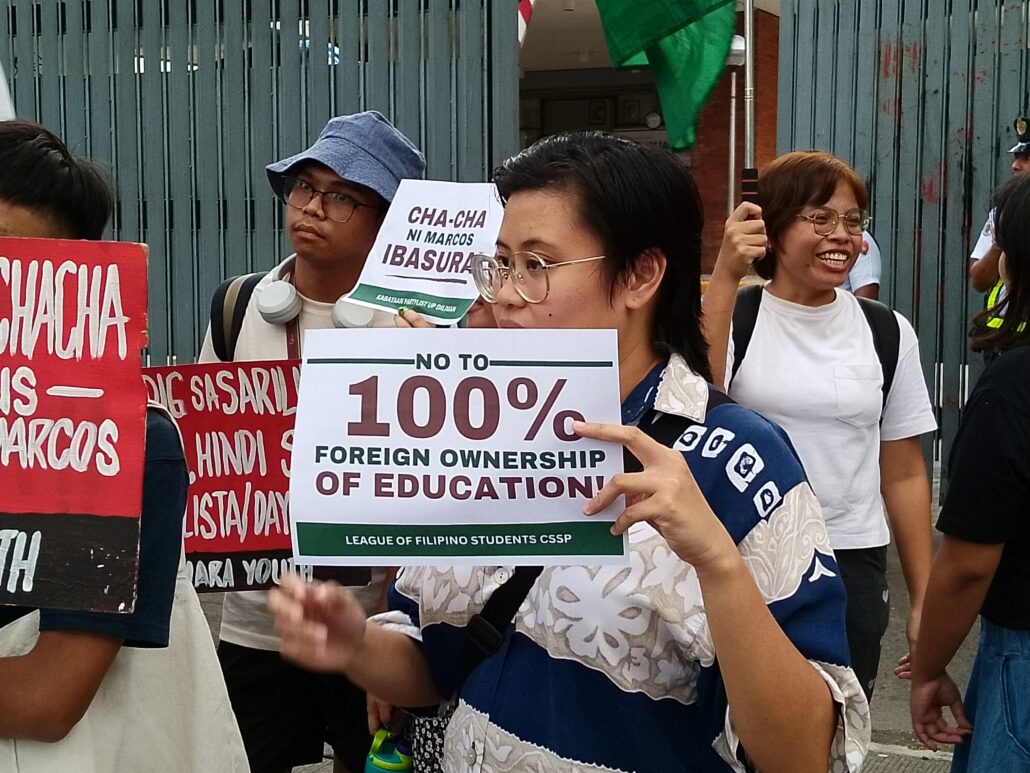Ligalig ang hatid ng ChaCha sa kabataan-estudyante
Ni Nuel M. Bacarra
Marahil ay nakaramdam na ang halos lahat sa atin kung paano magutom sa iba’t ibang pagkakataon. Maaaring nangyari ito minsan sa loob ng isa, tatlo o anim na oras. Para sa isang estudyante, mahirap mag-memorya o unawain ang leksyon kapag gutom. Paano pa kaya kung palagian itong nararamdaman hindi lamang ng isang estudyante kundi ng buong pamilya at mga indibidwal sa mga maralitang komunidad, sa kanayunan, sa mga pabrika at upisina, sa mga eskwelahan?
Sa inilabas na datos ng World Bank para sa taong 2023, ika-66 ang Pilipinas sa 125 bansa sa buong mundo na nakararanas ng gutom. Kritikal ito sa pag-unlad ng mga kabataang mag-aaral bilang “pag-asa ng bayan.” Hindi makakaahon ang bansa nito dahil sa halip na bigyang solusyon, binigyan pa ito ng katwiran sa pamamagitan ng kwentadang inilabas mismo ng gubyerno noong nakaraang taon na sapat na diumano sa isang mamamayang Pilipino na magkaroon ng ₱79.00 (₱395.00 sa lima katao) sa isang araw para mabuhay o ₱12,030.00 sa isang buwan para sa buong pamilyang may limang myembro. Taliwas ito sa hinihingi ng mga organisadong manggagawa na suportado ng iba’t ibang sektor ng lipunan na ₱1,193.00 na nakabubuhay na sahod sa isang araw para sa isang lima-kataong pamilya.
Sa ganitong pamantayan, lalong nalalantad ang pamahalaan na wala itong malasakit sa kapakanan ng sambayanan at bagkus ay nakatuon sa pagraratsada ng pagbabago ng Konstitusyon o charter change (ChaCha) upang ibayong manatili ang mga dinastiya sa poder.
Tulak ng paglaban
Tingnan na lamang natin ang matagal na kalagayan sa edukasyon.
Naisabatas ang Universal Access to Quality Tertiary Education Act (UAQTE) o RA 10931 noong 2017 dahil na rin sa kilusang masa at pagpupursige ng mga kabataang-estudyante. Ito ang batas na nag-institusyunalisa ng libreng matrikula at ng eksemsyon sa iba pang bayarin ng mga estudyante sa pampublikong pamantasan at kolehiyo sa buong bansa.
Bago umupo si dating senador Ralph Recto bilang Kalihim sa Pinansya ng gubyernong Marcos Jr., may panukala si dating Secretary Benjamin E. Diokno ng departamentong ito na kailangang repasuhin ang batas na ito dahil hindi ito kayang isustine at diumano, ay pag-aaksaya lamang ito ng pondo ng gubyerno. Si Diokno rin ang budget secretary ng gubyernong Duterte nang isabatas ang batas na ito.
Hindi lamang matrikula ang malaking problema ng mga estudyante, partikular sa kolehiyo. Ang pang-araw-araw na gastos tulad ng pamasahe, pagkain, bayad sa boarding house, proyekto sa paaralan at iba pa ay mga gastusin na kaakibat ng pagpasok sa mga pampublikong paaralan o pribado man.
Noong taong panuruan o academic year 2023-24, 35.15% (may talang pagbaba sa 2022-23 na 40.98%) ng mga estudyante ang huminto sa pag-aaral sa kolehiyo. Ang datos na ito ang isinangkalan para bawasan ang badyet para sa libreng edukasyon sa Kongreso. Sa halip na irepaso ang batas na ito, dapat pa ngang dagdagan ang pondo para rito. At sa huli, ang 113 na mga kolehiyo at pamantasan ng estado ay pinaglaanan ng ₱128.2B ng Konggreso, mas malaki nang ₱27.3B dagdag na badyet kaysa noong isang taon.
Ang krisis sa sistema ng edukasyon ay di nakaangkla sa pondong inilalaan ng gubyerno para lutasin ito. Kung magkaganoon, marapat lutasin muna ang malalang pamamayagpag ng katiwalian at korupsyon sa pamahalaan na sa ulat ng Commision on Audit, taun-taon halos ay 20% ng pambansang badyet ang napupunta sa korupsyon. Kung kukwentahin sa badyet noong 2023 aabot ito ng ₱1.04T. Nariyan rin ang mas malalaking badyet sa pagbabayad ng utang na aabot sa ₱670.5B at sa depensa na ₱282.7B (mas malaki nang ₱50.2B kumpara noong 2023).

Ratsada ChaCha
Sa talumpati ni Representative Raoul Manuel ng Kabataan Partylist noong Marso 22 sa rali sa harap ng pambansang tanggapan ng Commission on Higher Eduction, sinabi niya, “Mas magiging de-kalidad raw ang edukasyon sa Pilipinas kapag ibinukas iyan sa mga banyaga. Una sa lahat, bakit natin iaasa sa mga dayuhan ang pagpapataas ng kalidad ng edukasyon? Ang numero unong may trabaho niyan, hindi ba ang gubyerno?”
Ganito niya hinamon ang mga kabataang kasama niya sa rali sa kahabaan ng C.P. Garcia Avenue. At saka niya idinagdag: “Ang punto natin, hangga’t ang gubyerno ay nakakiling sa pagnenegosyo sa edukasyon, lalong palalalain ng charter change ang rate ng matrikula sa mga pribadong paaralan.”
Nasa panganib ng paglamon ng mga dayuhan ang buong sistema ng pampublikong edukasyon sa bansa sakaling maisalaksak sa mamamayan ang pagbago ng konstitusyon. Isasapribado ang mga kolehiyo at pamantansang publiko at kung gayon ay lalong lalala ang bilang ng mga di makatatapos ng kurso o mas malamang pa nga, hindi makatutuntong ng kolehiyo ang karamihan ng kabataan.
Sa kasalukuyan may mga nakaambang pagtaas ng matrikula sa mga pribadong paaralan, pinakamalaki ang sampung porsyentong pagtaas sa St. Paul University; 6% sa University of the East, Ateneo at Lyceum; habang 5% naman sa De La Salle at National University. Ang mga kabataang-estudyante sa Polytechnic University of the Philippines ay sige-sige ang protesta sa kinatatakutang pagsasa-pribado ng paaralan.
Sasagasaan tiyak ito ng ekonomikong probisyong babaguhin sa saligang batas. Sa ilalim ng Konstitusyon ng 1987 nakasaad na kailangang protektahan at itaguyod ng gubyerno ang karapatan ng mamamayan sa de-kalidad na edukasyon at kung gayon ay gawin ang nararapat na mga hakbang upang maging abot-kaya ang edukasyon sa lahat ng Pilipino.
Ani Elle Buntag, pambansang tagapangulo ng League of Filipino Students: “Nagiging rubber stamp ang CHED ng mga ganid sa tubo na mga nagnenegosyo sa mga pamantasan. Hindi na baleng may mga estudyante na hindi na kayaning makapag-aral dahil sa tuition fee increase.” Sinabi niya ito sa rali sa harap ng opisina ng CHED.
Inutil ang CHED sa kapritso ng mga pribadong paaralan sa usapin ng pagtataas ng matrikula at iba pang bayarin. Dagdag pa ni Buntag: “Ang sagot ni Marcos Jr. sa sistematikong problema na idinadaing natin, walang iba kundi ang ibenta ang mga paaralan natin sa dayuhan sa pamamagitan ng charter change.”

Saan ang dulo?
Ang ekonomikong probisyon na inilatag ng Kongreso sa pamamagitan ng Resolution of Both Houses 7 at pinagtibay sa ikatlo at huling pagdinig nitong Marso 20 ay nakatuon sa pribatisasyon ng pampublikong institusyong pang-edukasyon, yutilidad (serbisyo) at advertising. Hindi garantiya ang pagsasapribado ng mga pampublikong paaralan sa pagpapaunlad ng sistema ng edukasyon o ni katiting na bahagdan ng buong ekonomya. Isasapribado ang yutilidad gaya ng pampublikong transportasyon, sistema ng serbisyo ng tubig at kuryente pero aasa at aasa pa rin ang bansa sa padala ng mga manggagawa sa ibayong dagat para pagulungin ang ekonomya. Sa sitwasyong ito ng pagbago ng konstitusyon, dadami at dadami pa ang mga Pilipinong maghahanap ng trabaho sa ibang ibansa na may relatibong mas malaking kita dahil na rin sa kawalan at kakulangan ng trabaho sa ating sariling bansa.
Tuso ang konggreso sa pagsisingit ng pariralang “unless provided by law” sa ilang probisyong babaguhin sa konstitusyon. Ang ibig sabihin lamang nito ay gagawa lamang ng batas ang konggreso para ikutan ang konstitusyon at balewalain ito.
Hindi sapat ang pagkakaroon ng mas malaking foreign direct investment (FDI) para umunlad ang Pilipinas gaya ng pagtingin ng mga tagpagtaguyod ng ChaCha. Noong 1970s at 1980s kung saan pinalakas ng South Korea at Taiwan ang proteksyunismo sa kanilang bansa, mas malaki ang FDI na pumasok sa Pilipinas kaysa sa dalawang bansang ito pero nakapagsarili sila at naging mga bagong nag-industriyalisang bansa.
Ang ikinababahala ng mga estudyante sa pagbago ng konstitusyon ay ang lalong pagkalubog sa kontrol ng dayuhan hindi lamang sa mga paaralan o sistema ng edukasyon kundi ng buong bansa. Kung kontralado ng dayuhan ang sistema ng edukasyon, ang kultura ng pagiging makabansa o makabayan ay buburahin sa kaisipan ng kabataan. Hindi pa nga naisasapribado ang mga pampublikong kolehiyo at unibersidad sa bansa, may sarili nang palo ang rehimeng Marcos Jr. na baluktutin ang kasaysayan sa pamamagitan ng “pagpapabango” sa imahe ng pamilya niya na kinilala sa buong mundo bilang isang pasistang diktador at mandarambong.
Walang maaasahang kaunlaran sa ChaCha. Sa ngayon pa lamang ay inutil ang gubyerno sa kawalang kontrol sa pagtaas ng presyo ng mga pangunahing bilihin na wala namang kaakibat na pagtaas ng sahod ng mga manggagawa at empleyado. Hindi kaunlaran ang dulot nito kundi ang malinaw na pagbibigay-luho sa dayuhan para dambungin ang bansa. Malinaw na ang pagbubukas sa dayuhan ng syento porsyentong pag-aari ng lupain, at negosyo sa eskwelahan at serbisyo publiko ay langis lamang na magpapadulas para sa pagpapakatuta ng mga nanunugkulan sa gubyerno at ng mahabang panahon sa poder. #




